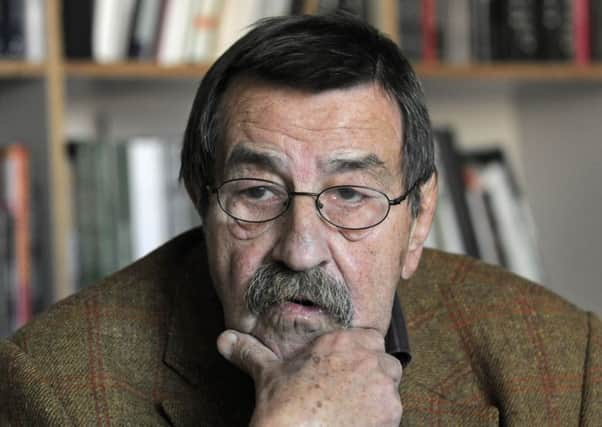Günter Grass, Nobel Prize-winning author, dies at 87


Nobel Prize-winning author Günter Grass, who was credited with portraying “the forgotten face of history”, has died aged 87.
The novelist, poet and playwright, who was best known for his novel The Tin Drum, died in a hospital in the German city of Luebeck yesterday morning.
Advertisement
Hide AdAdvertisement
Hide AdHe was believed to have been having treatment for a lung infection.
The German foreign minister Frank-Walter Steinmeier said on Twitter that he was “profoundly devastated” by the author’s death.
A tweet from the official account of the Nobel Prize, which was awarded to Grass in 1999, added: “Grass was one of few German writers who could claim to be, if not a public intellectual, at least a public citizen.”
Grass, who was often seen in photographs puffing on a pipe, was lauded by Germans for helping to revive their culture in the aftermath of the Second World War and helping to give voice and support to democratic discourse after the war.
Yet he provoked the ire of many in 2006 when he revealed in his memoir Skinning the Onion that, as a teenager, he had served in the Waffen-SS, the combat arm of Adolf Hitler’s notorious paramilitary organisation.
Critics made calls for him to return his Nobel Prize for Literature – an award he had received for his work in addressing Germany’s past for a new generation.
The Scandinavian judges described his 1959 novel The Tin Drum – which was made into a successful film that won the Palme d’Or at the 1979 Cannes Film Festival – as if “German literature had been granted a new beginning after decades of linguistic and moral destruction”.
They also praised Grass’s “creative irreverence” and “cheerful destructiveness”.
Grass defended the news that he had once served in the SS.
Advertisement
Hide AdAdvertisement
Hide Ad“My silence through all these years is one of the reasons why I wrote this book,” Grass said. “It had to come out finally.”
In 2012, Grass drew sharp criticism in his home country and was declared persona non grata by Israel after publishing a prose poem, What Must Be Said, in which he criticised what he described as Western hypocrisy over Israel’s nuclear program and labelled the country a threat to “already fragile world peace” over its belligerent stance on Iran.
For ten years, he held the post of speechwriter for German chancellor Willy Brandt, who served as head of the Social Democratic Party (SDP) from 1969 to 1974.
He often spoke out against German reunification, which he compared to Hitler’s “annexation” of Austria.
Andrea Nahles, the SPD’s secretary general, yesterday paid tribute to Grass for being a “polemical intellectual”.
Throughout his long and varied career, Grass also spent a stint working in a mine and at one point, received training in stonemasonry.
He also studied sculpture and graphics, first at the Kunstakademie Dusseldorf, then at the Berlin University of the Arts.
Grass’s home town of Danzig, where he was brought up as the son of grocery shop owners, became the Polish city of Gdansk after the war.
The city was the setting for what became known as the
Advertisement
Hide AdAdvertisement
Hide AdDanzig trilogy – Tin Drum, the novella Cat and Mouse and Dog Years.
The trilogy captured the German reaction to the rise of Nazism, the horrors of the war and the guilt that lingered after Hitler’s defeat.
In the trilogy, Grass drew partly on his own experience of military service and his captivity as a prisoner of war. He spent his later years in the northern city of Luebeck.
Excerpts from the writing and speeches of Grass:
“My new marching orders made it clear where the recruit with my name was to undergo basic training: on a drill ground of the Waffen SS, as a panzer gunner, somewhere far off in the Bohemian Woods. The question is: Was I frightened? There is nothing carved into the onion skin of my memory that can be read as a sign of shock, let alone horror. I most likely viewed the Waffen SS as an elite unit that was sent into action whenever a breach in the frontline had to be stopped up”
From 2007 autobiographical profile in The New Yorker.
“I may as well come right out with it: I was one of those clairaudient infants whose mental development is completed at birth. The moment I was born I took a very critical attitude toward the first utterances to slip from my parents beneath the light bulbs. After meditating at some length on what I had heard, I decided to do certain things and on no account to do certain others”
From The Tin Drum.
“I have a nightmare vision of a postwar generation that grows up in the traditional straitjacket of nation-statehood. I try to explain to my 12-year-old sons how the old nationalism continues to make its presence felt. I realise how great the national vacuum is, and how quickly it might be filled again by the demagogues who are always waiting in the wings. The nationalist stew of yore may have gone sour, but it still finds takers”
From a 1970 speech.
“Everything that has thus far become a book for me has been subservient to time. First and foremost, I found myself harnessed to German time. There’s no end to it. So many dead. And everywhere, even where life might release joy and pleasure might take its fling, the great crime casts its shadow, which time cannot efface”
From a 1982 speech.
“Let us not act as if we cornered the market on democracy”
From a 2009 AP Interview.
FOLLOW US
SCOTSMAN TABLET AND MOBILE APPS